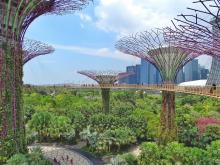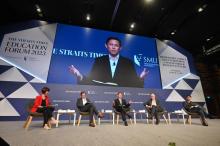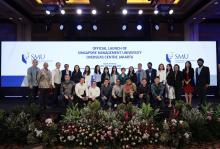An organisation can signal its commitment to sustainability through green certification and labels, or marketing campaigns with messages of environmental stewardship. However, according to Thomas Menkhoff, Professor of Organisational Behaviour & Human Resources and Dr Kevin Cheong, Adjunct Teaching Mentor at SMU, making bold statements and focusing solely on operational changes such as the eradication of single-use plastics is not enough to drive meaningful change.
Higher education has been central to Singapore's rise as one of the world's strongest economies. Now, these Institutes of Higher Learning (IHLs) have an additional role in shaping, influencing and contributing to Singapore's Green Plan 2030, a plan that sets out the Republic’s aspirations for a green, sustainable and resilient economy. This was the central point of discussion at the Straits Times Education Forum, held on 11 March 2023, in partnership with the Singapore Management University (SMU).
The demand for talent in the field of sustainability is increasing, but the amount of expertise in the field is thin. As more nations take the step towards transitioning to greener and more sustainable economies, there is a need to develop workers with the necessary skills through a sustainability talent pipeline (a pool of candidates ready and equipped to take on the positions).
Last Update 05 June, 2023
At the 2015 UN Climate Change Conference (COP21) in Paris, world leaders agreed to work together to maintain global warming to no more than 1.5° C. Two targets were set in the Paris Agreement - achieving 45% reduction in emissions by 2030, and reaching net zero by 2050.
Pricing climate risks properly today reduces the possibility of wealth transfers between uninformed and sophisticated agents, and the likelihood of extre
According to a December 2018 UN report on worldwide use of single-use plastics, 127 countries have “adopted some type of legislation to regulate plastic bags”. These include the 28 member states of the European Union, who last month voted to ban single-use plastic cutlery, straws, and cups by 2021.
[podcast id=692632465]Assistant Professor Aidan Wong from SMU’s School of Social Sciences discusses the value of electronic waste recycling and sustainability in Singapore.[/podcast]
Assistant Professor of Humanities Aidan Wong from SMU’s School of Social Sciences has researched on the areas of development and sustainability, in particular on electronic waste, informal labour and economic development.
- Read more about Adopting sustainable urban development measures for continued economic growth
- 414 views
Associate Professor of Humanities Winston Chow from SMU’s School of Social Sciences has researched on the areas of urban vulnerability to climate change; sustainability in urban climatology; and perceptions of environmental and climate change in tourism.
Global warming and climate change have created an unprecedented global interest in reducing greenhouse gas emissions, especially in energy production. Biomass, or organic matter, which is a renewable energy source that can replace fossil fuels in energy production is gaining popularity. Consequently







